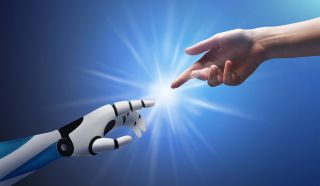Artificial Intelligence
How AI Will Change Our Lives
AI technology will transform humanity as we know it. Humans need to level up.
Posted March 10, 2023 Reviewed by Gary Drevitch
Key points
- AI is going to change human civilization as we know it.
- AIs bring both promise and peril with them. As all technologies do, they will evolve over time.
- Humanity cannot afford to be divided about AI. We need to work together to capitalize on their many benefits while mitigating their risks.

Dear Fellow Human Beings,
You have probably been reading and hearing about AI quite a bit recently, and many of us are freaked out about it. The articles, podcasts, and news about AI are proliferating almost as fast as AI itself as they begin to permeate every part of our civilization. This is a testament to the reality we hope and fear: AIs will transform humanity as we know it.
AIs are not merely another "disruptive technology" like smartphones and social media. They are a civilization-altering technology. While we have already been using AIs in different forms for a while now, Open AI ignited an AI arms race when they released ChatGPT, a machine language learning model (narrow AI), on November 30, 2022.
We will be using AIs to create a new world, a new Earth. We need to be asking ourselves some existential yet pressing questions, such as:
- What kind of new Earth do we want this to be?
- How shall we live in a world in which AIs are increasingly intertwined with our daily lives?
- What do AIs mean for the future of humanity, especially as they evolve and, inevitably, far surpass human intelligence?
- What does it mean to be human as advanced AI chatbots begin to look, sound, and interact more and more like human beings (e.g., human-like CGI avatars in the Metaverse or when combined with advanced robotics)?
Why Humanity Needs to "Level Up" Because of AIs
AIs are already a powerful technology that will only grow exponentially more so as they swiftly proliferate and permeate every part of civilization. There will not be one AI; there will be countless AIs with the chatbot versions having their own "personalities," if you will. AIs are different than any other technology in human history. The potential for AIs to be both beneficial and harmful grows concurrently as their power increases, and they become woven into the very fabric of our civilization. They have the potential to change, evolve, and behave in very unpredictable ways (i.e., the "black box" problem). Even well-intentioned uses can lead to unintended and unimagined consequences. Given these qualities of AI, it behooves humanity to slow down a bit and work together wisely and skillfully in a unified effort to capitalize on the tremendous benefits that these AIs have to offer us while mitigating the many substantial risks.
I am making this next statement unequivocally and without any reservations: If we humans were to be so foolish as to harness the evolving powers of artificial intelligence to find more "intelligent" ways to attack one another (e.g., weaponizing AIs to spread fear, anger, hate, lies, misinformation, deep fakes, vilifying and undermining rivals or enemies), this would result in significant, and perhaps even catastrophic, levels of unnecessary suffering. We cannot allow this to happen.
The series of weekly posts that begins here is a call to action. Humanity, it is time to level up.
The Good, the Bad, and the Ugly of Our Technologies Is... Us
Our technologies are neither good nor bad. They just are. It is how we use them that makes the difference. A brick can be used to help build a house or kill someone. Books are great, but Adolf Hitler published Mein Kampf. Nuclear energy can be used to power our cities or obliterate them. We cannot reap the benefits of any new technology without it also opening the door to misuse and the law of unintended and unimagined consequences.
In this way, our technological innovations are a mirror and lens that reflect and magnify what is best and worst in us. The more powerful our technologies become, the more their power to reflect and magnify the best and worst of us grows concurrently with them. What are AIs going to reflect and magnify in us? What do we hope these AIs reflect and magnify in us? What would it look like if AIs were to be used to magnify our differences and divisions?
An Important Question That We All Need to Ask Ourselves
My fellow human beings, has what you have seen in humanity's history, from our distant past to more recent events, given you the confidence that we have the wisdom to skillfully wield the power of AIs as they evolve and proliferate?
I will speak for myself, and I think for many others as well, when I say that I am deeply concerned that, given our increasing levels of toxic political polarization and other questionable variables, humanity is not ready for the unique challenges that AIs pose. I am writing this series as a concerned citizen of planet Earth.
AIs May Be the Greatest Challenge Humanity Has Ever Faced
The issue of how we manage AIs is incredibly important. We need to take it seriously, head-on, and right away because AIs will likely be the greatest challenge humanity has ever faced. As they evolve and proliferate, AIs will continuously test us in novel, unexpected ways. This advanced, technological world that we are co-creating with AIs is massively discrepant from that of our evolutionary ancestors. The problem of evolutionary mismatch, which already explains many of our struggles in our modern world, will be amplified exponentially by evolving AIs that leave our biological evolution in the digital dust.
I want to be clear: I am not claiming that AIs will be the end of humanity. With a nod to Game of Thrones, I am not saying, "Winter is coming." What I am saying, though, is that the weather forecast ahead is unprecedented, unpredictable, with a chance above zero of some Category 5 hurricanes.
Yet, there is a way to master this challenge. I am not claiming that I know how, my fellow human beings. I am going one further: I am claiming that we already know how. It is the truth that we have always known. It is just that the colossal challenges that AIs pose necessitate that we rise to these challenges quickly. To paraphrase the late, great cosmologist Carl Sagan: Extraordinary challenges require extraordinary efforts.
The Solution Is Us
If we humans are our own greatest problem, this logically means that we can be our own greatest solution as well. There is hope that we can successfully manage the daunting challenges posed by AI while capitalizing upon its tantalizing potential because of this truth: When we human beings work together, as one, there is absolutely nothing we cannot accomplish or overcome. To do this, we must master the most formidable obstacle humanity has ever faced: Ourselves. That is, we must overcome that which keeps us separate from one another - that keeps us from loving our neighbors as ourselves. Loving our neighbors is challenging enough, and loving our enemies seems like a fantasy. My fellow human beings, we have our work cut out for us.
Yet, when it comes down to it, we humans can see that we are all connected. We all want to be happy, and we do not wish to suffer. We love our kids and our deepest wish is that they grow up to be happy, healthy, and have a life full of love. We want the world that they inherit to be better than the one in which we live. We also wish the same for our partners, friends, and family. Are we able to transcend our inner circle and wish this for everyone? If you seek a challenge, this is the most difficult challenge of them all.
Our greatest spiritual teachers, sages, philosophers, poets, songwriters, and artists have been imploring us to transcend our differences since ancient times. It is contained within the original motto of the United States: E Pluribus Unum, which means, "Out of many, one." While it is true that we are all connected, too often we let our differences overshadow that which binds us. As Bono of U2 sings in their sublime song of love and transcendence, One: We are one, but we are not the same. That is, we can work toward unity and the heart of our connection by acknowledging, accepting, and respecting our differences.
My fellow human beings, as we move forward into this new Earth with evolving AIs, we face both tremendous opportunities and risks. To overcome these challenges with the utmost skill, we must transcend our differences and come together. Now is the time for humanity to rise up as one. This is the only path forward, and the choice is up to us.




